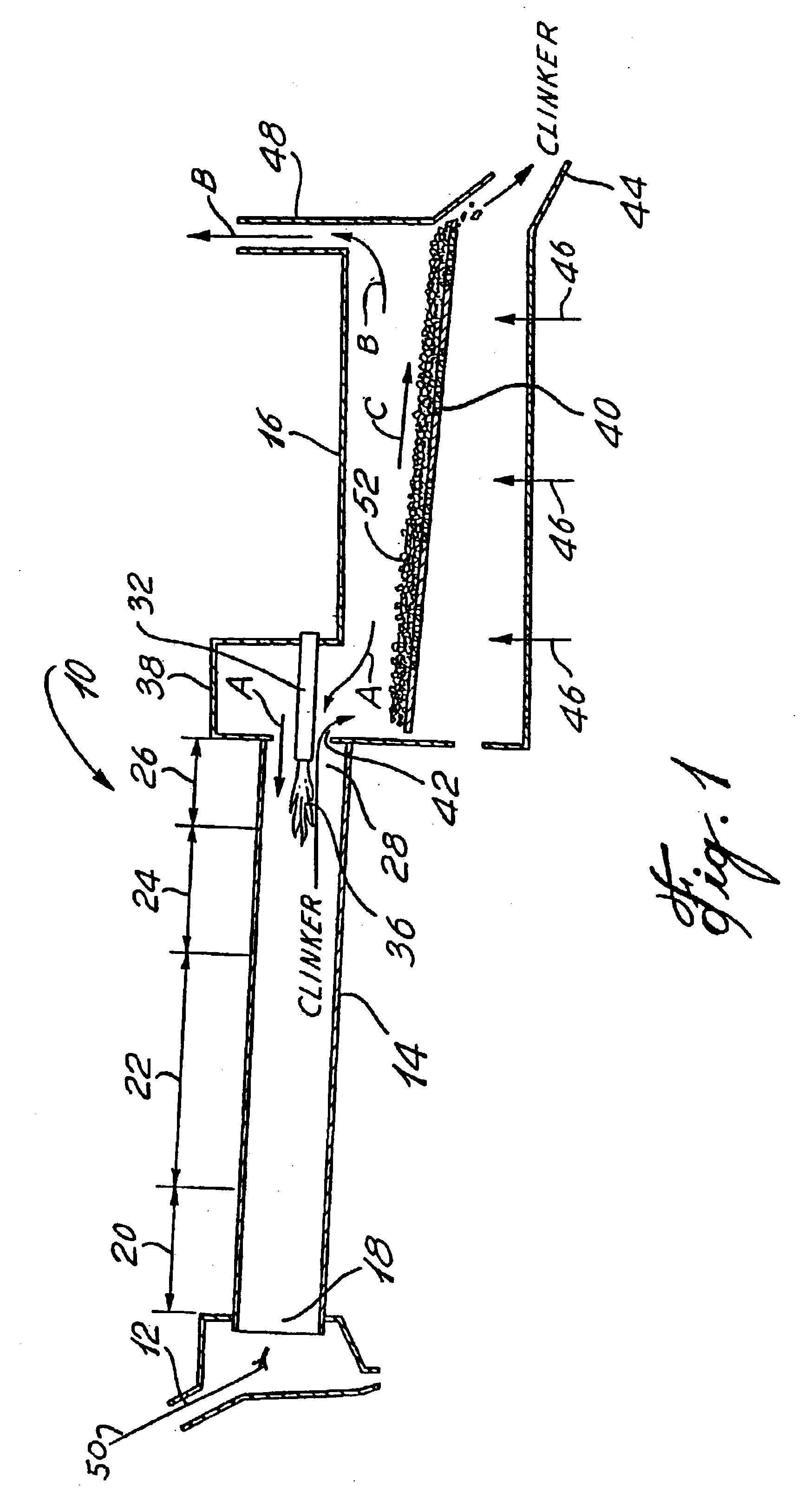Process for incorporating coal ash into cement clinker
a cement clinker and coal ash technology, applied in the direction of furnaces, lighting and heating apparatuses, furnace types, etc., can solve the problems of large quantities produced still presenting disposal problems, fine particles can present handling problems,
Inactive Publication Date: 2004-07-20
LAFARGE CANADA INC
View PDF14 Cites 9 Cited by
- Summary
- Abstract
- Description
- Claims
- Application Information
AI Technical Summary
Benefits of technology
"The invention relates to a process for producing cement clinker using coal ash as a source of calcium. The technical effect of this invention is to reduce carbon dioxide emissions from cement clinker production. The fly ash used in the invention is derived predominantly from lignite and sub-bituminous coal sources, which are typically produced in power plants. By replacing a portion of the calcium carbonate source with coal ash, the amount of carbon dioxide emissions from the cement clinker production process is reduced. The use of coal ash as a source of calcium has been previously limited due to the difficulty in handling the fine particles of the ash. However, this invention provides a solution for reducing carbon dioxide emissions and disposal problems associated with the production of cement clinker."
Problems solved by technology
Method used
the structure of the environmentally friendly knitted fabric provided by the present invention; figure 2 Flow chart of the yarn wrapping machine for environmentally friendly knitted fabrics and storage devices; image 3 Is the parameter map of the yarn covering machine
View moreImage
Smart Image Click on the blue labels to locate them in the text.
Smart ImageViewing Examples
Examples
Experimental program
Comparison scheme
Effect test
example
i) Trials
Different formulations of clinker feed ingredients are summarized below in the Table, to demonstrate the variation of contribution of Ca, Al, Si and Fe to the resulting clinker, that can be achieved by replacement of different amounts of limestone (calcium carbonate) by different amounts of coal ash, in accordance with the invention.
Minor oxides are not accounted for in the in the final chemistries summarized in the Table.
the structure of the environmentally friendly knitted fabric provided by the present invention; figure 2 Flow chart of the yarn wrapping machine for environmentally friendly knitted fabrics and storage devices; image 3 Is the parameter map of the yarn covering machine
Login to View More PUM
| Property | Measurement | Unit |
|---|---|---|
| size | aaaaa | aaaaa |
| particle size | aaaaa | aaaaa |
| particle size | aaaaa | aaaaa |
Login to View More
Abstract
A method of cement clinker manufacture comprises feeding a clinker feed material containing a source of calcium carbonate into a feed end of a cement kiln, the feed material is heat processed in the kiln to produce cement clinker with emission of carbon dioxide from thermal decomposition of said source of calcium carbonate and discharge of the carbon dioxide from the kiln, and cement clinker is discharged from a discharge end of the kiln; a coal ash derived from burning pulverized lignite or sub-bituminous coal is included in the feed material fed into the feed end to replace a portion of the source of calcium carbonate, and provides a source of calcium as well as other components notably silicon and aluminum, in the formation of the cement clinker, with a lowering of the emission of carbon dioxide in the kiln, per unit weight of cement clinker produced.
Description
1. Technical FieldThis invention relates to a process for producing a cement clinker having a content of coal ash as a source of calcium in the feedstock introduced into the cement kiln; more especially the invention is concerned with such a process in which the coal ash is derived predominantly from lignite and sub-bituminous coal sources. The fly ash component of this type of coal ash is referred to as Class C.2. Description of the Prior ArtIn a cement plant, cement clinker is created at elevated temperatures in a cement kiln from cement clinker raw ingredients which travel through the kiln from a feed end to a discharge end, while passing through different processing zones at elevated temperature. These processing zones include a calcining and a clinkering or burning zone.Cement clinker comprises various cement compounds formed from the raw ingredients, for example dicalcium silicate, tricalcium silicate, tricalcium aluminate and tetracalcium aluminoferrite. Formation of these ce...
Claims
the structure of the environmentally friendly knitted fabric provided by the present invention; figure 2 Flow chart of the yarn wrapping machine for environmentally friendly knitted fabrics and storage devices; image 3 Is the parameter map of the yarn covering machine
Login to View More Application Information
Patent Timeline
 Login to View More
Login to View More Patent Type & Authority Patents(United States)
IPC IPC(8): C04B7/00C04B7/43C04B7/44C04B7/48C04B7/12F27B7/20C04B7/28C04B7/40
CPCC04B7/28C04B7/40C04B7/367C04B7/421C04B7/26Y02P40/10
Inventor OATES, DAVID BRIDSONVAN SLOTEN, ALAN
Owner LAFARGE CANADA INC
Features
- R&D
- Intellectual Property
- Life Sciences
- Materials
- Tech Scout
Why Patsnap Eureka
- Unparalleled Data Quality
- Higher Quality Content
- 60% Fewer Hallucinations
Social media
Patsnap Eureka Blog
Learn More Browse by: Latest US Patents, China's latest patents, Technical Efficacy Thesaurus, Application Domain, Technology Topic, Popular Technical Reports.
© 2025 PatSnap. All rights reserved.Legal|Privacy policy|Modern Slavery Act Transparency Statement|Sitemap|About US| Contact US: help@patsnap.com

